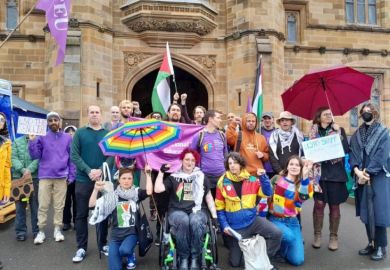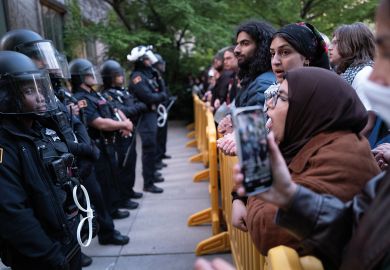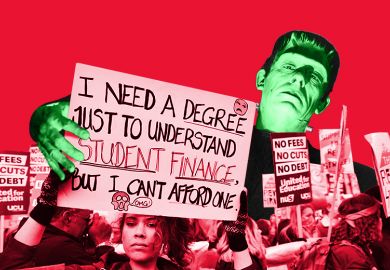Australian vice-chancellors have so far resisted pressure to disband pro-Palestinian encampments on their campuses, amid escalating protest action and demands for crackdowns.
Administrators at three universities have instructed students to dismantle the camps and – in one case – cease occupying a university building, citing “considerable damage” and threats to health and safety. However, the directives are yet to be enforced.
The University of Melbourne said it was consulting police after students and “external actors” occupied the Arts West building on the university’s Parkville campus, spurning directions to leave and forcing the cancellation of 150 classes.
“We are in ongoing discussions with the police,” deputy vice-chancellor Michael Wesley said in a statement. “They are advising us about how we keep this situation under control and…how we might move forward to end the protests and the occupation.
“Students have a right to protest but that is not a blank cheque. They…crossed a line when they occupied the Arts West building. The university’s patience is now at an end.”
Australian National University told students to leave a protest camp by 17 May “for the purposes of health and safety and good order of the campus”.
In letters to seven students, deputy vice-chancellor Grady Venville said the university was not disciplining them over the encampment or limiting their right to protest peacefully elsewhere.
Meanwhile, students at Deakin University have defied requests to dismantle an encampment at Morgan’s Walk, the main pedestrian thoroughfare at the university’s Burwood campus, following reports of unacceptable behaviour.
“We cannot allow vitriol, personal attack and intimidation to undermine our ability to engage in the considered debate, discussion and deliberation that is required to meaningfully address complex and challenging issues,” vice-chancellor Iain Martin said in a statement posted on the university’s website.
Administrators’ failure to enforce their instructions has reportedly enraged prominent members of Australia’s Jewish community, with former federal treasurer Josh Frydenberg – presenter of a forthcoming documentary on antisemitism – exhorting vice-chancellors to expel the “camps of hate” from their campuses.
Campus resource collection: What can universities do to protect academic freedom?
The Executive Council of Australian Jewry, which has been demanding the camps’ disbandment since late April, called for “strong and decisive” action from vice-chancellors. “The time for indulging and appeasing insolent children running amok has passed,” co-chief executive Alex Ryvchin told The Australian. “If the university can’t ensure the immediate safety and security of all students and staff, the police need to.”
Former Australian chief scientist and Monash University chancellor Alan Finkel said vice-chancellors were being judged harshly because of past failures to “honour the tradition of freedom of speech”. He said universities had occasionally cancelled scheduled appearances by visiting speakers over concerns that they might offend listeners.
“Universities have not been perfect in the past, and a lot of people have jumped to judge them negatively in the case of the encampments. They’re saying: ‘The university is allowing voices that previously it would have shut down on some other topic.’”
Dr Finkel said speakers should be cancelled only if their words were likely to incite hatred or violence. “I don’t think universities have always interpreted that well in the past, but at this moment they’re trying to.”
Register to continue
Why register?
- Registration is free and only takes a moment
- Once registered, you can read 3 articles a month
- Sign up for our newsletter
Subscribe
Or subscribe for unlimited access to:
- Unlimited access to news, views, insights & reviews
- Digital editions
- Digital access to THE’s university and college rankings analysis
Already registered or a current subscriber?










